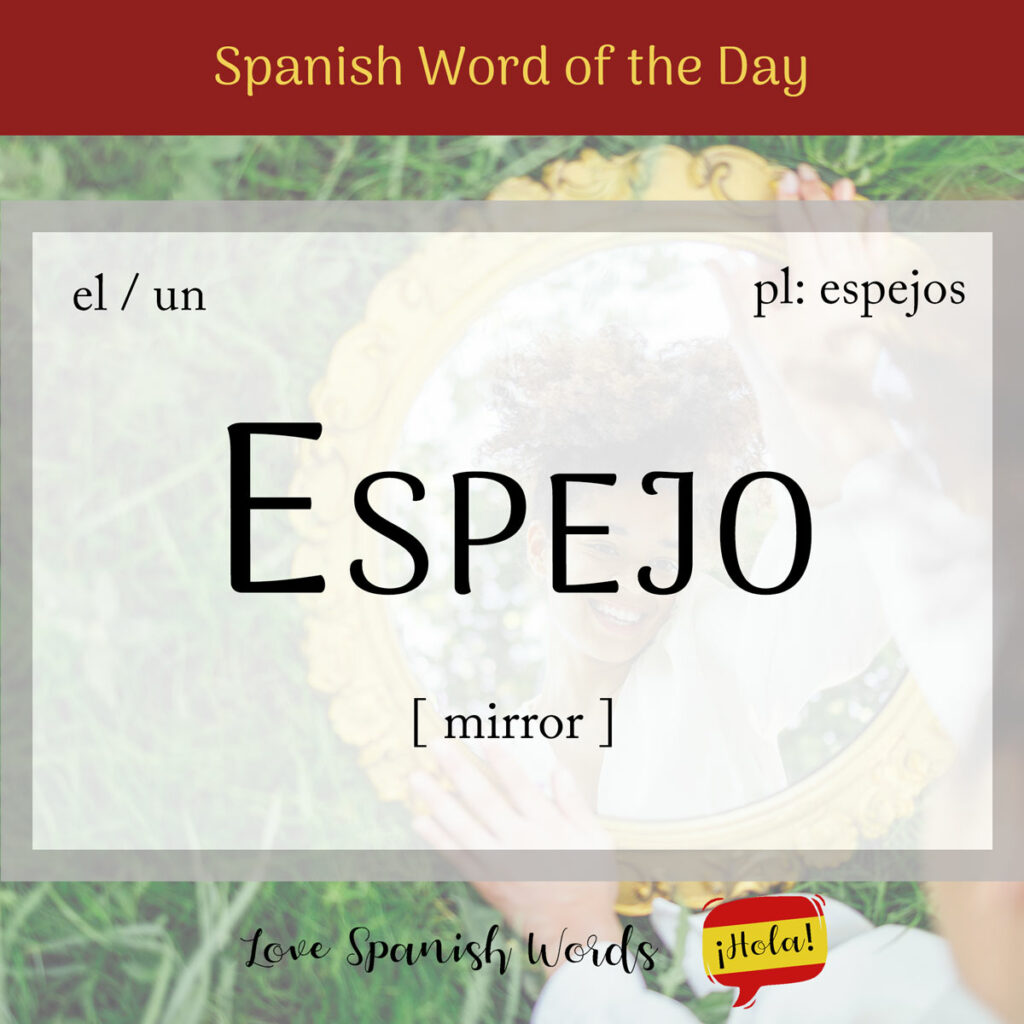The Spanish word espejo, which means mirror in English, derives from the Latin word speculum. Speculum is taken from the Latin verb specere meaning to see or to look. Espejo reflects the concept of using a mirror as an object for seeing and looking at one’s reflection.
Latin American Pronunciation
European Pronunciation

Espejo is a masculine noun and it takes the following definite and indefinite articles:
- el espejo = the mirror
- los espejos = the mirrors
- un espejo = a mirror
- unos espejos = some mirrors
Cada mañana, Ana se mira en el espejo antes de salir de casa.
Every morning, Ana looks at herself in the mirror before leaving home.
Some words that incorporate espejo include:
- espejismo = mirage
- espejo retrovisor = rear-view mirror
- espejo convexo = convex mirror
- espejo cóncavo = concave mirror
- espejo plano = plane mirror
- espejo de aumento = augmented mirror
- espejo de dos vías = two-way mirror
- espejo tintado = tinted mirror
- espejo decorativo = decorative mirror
- espejo portátil = portable mirror
José usó el espejo retrovisor para salir del garaje.
Jose used the rear-view mirror to exit the garage.
Espejos as objects are used everywhere. You can find them in hogares (homes), baños (bathrooms), vestidores (dressing rooms), and vehículos (vehicles). There are also small espejos portátiles (handheld mirrors) to carry in purses, and ones used for decoración (decoration) and arte (art).
El artista utilizó fragmentos de espejos rotos para crear un mosaico impresionante.
The artist used broken mirror fragments to create a stunning mosaic.
The word espejo as a reflection is a metaphor used commonly to describe or reveal the true nature, appearance, or state of a thing. For example, Las acciones de una persona son el espejo de su carácter. (A person’s actions are the mirror -reflection- of their character.
Along the same lines of espejo as a reflection, is the popular metaphor used in Spanish, espejo de la realidad. It translates to “mirror of reality.” It serves as a metaphor used to talk about truth and the reflection of the real situation or condition of something or the world around us.
The phrase is used as a form of self-reflection, in literature and art to speak about social issues, in media and journalism to talk about world problems, and in science and philosophy to talk about theories and laws.
An example of how it can be used in a sentence is, El documental sirvió como espejo de la realidad respecto a la pobreza y desigualdad que existe en el mundo hoy en día. (The documentary served as a mirror of reality regarding the poverty and inequality existing in the world today.)
One popular expression using espejo is espejo del alma (soul’s mirror). It is used to describe and highlight what the eyes express that sometimes our soul and words cannot. It suggests you can see through someone’s eyes and understand their character and feelings. Example: Los ojos de mi madre son un espejo a su alma y revelan su tristeza tras perder a un hijo. (My mother’s eyes are a mirror to her soul and reveal her sadness after losing a child).

An indirect metaphor relating to espejo is ser como dos gotas de agua. It means to be like two drops of water. It’s used to describe two people who are identical to each other physically, personality-wise, behaviour-wise, or even because of their experiences and opinions. It’s as if they were an espejo (mirror) reflection of each other.

Spanish idiomatic expressions featuring ‘espejo’
Romper el espejo
Literal translation: to break the mirror
English meaning: to break the mirror due to ugliness or break the mirror due to having superstitious bad luck. (This superstitious belief says that breaking a mirror causes 7 years of bad luck.)
Mirarse en el espejo de alguien
Literal translation: to see yourself in someone else’s mirror
English meaning: to learn about someone else’s errors or success and put yourself in their position hypothetically speaking
Ver tu alma reflejada en el espejo
Literal translation: to see your soul reflected in the mirror
English meaning: to auto-reflect, discover personal growth after confronting your inner self or your interior, to see past the physical appearance and instead see your emotions, thoughts, and deepest values

